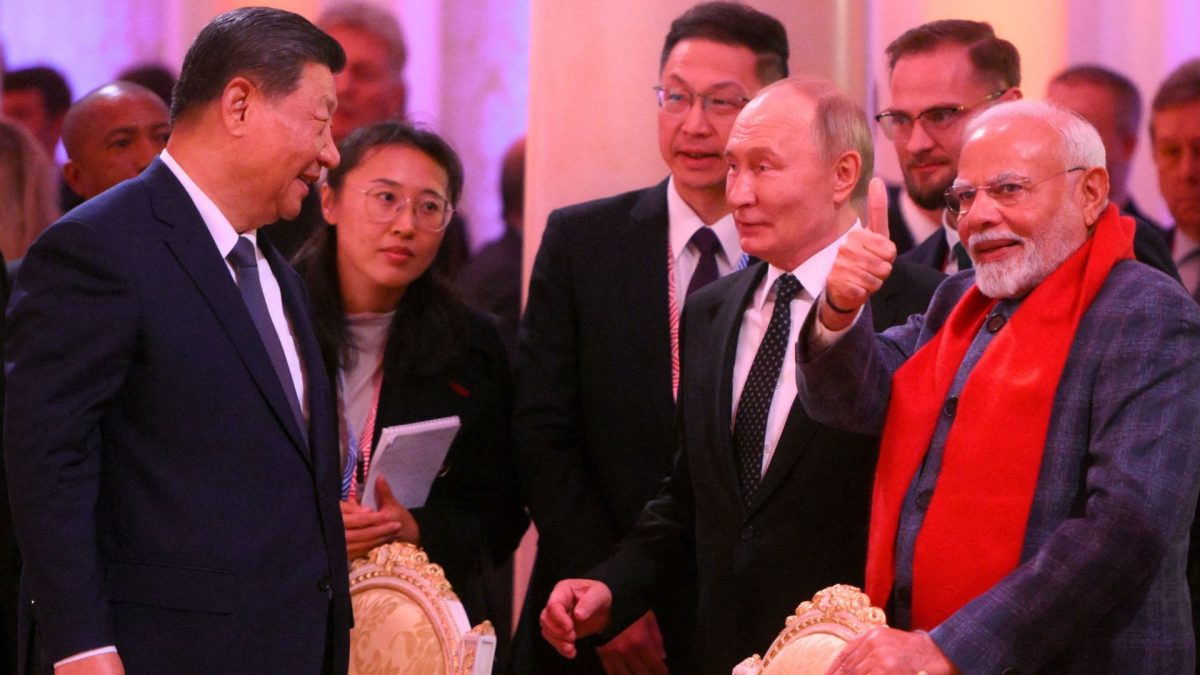Prime Minister Narendra Modi undertook his most complex foreign policy task till date as India engaged with the intricate BRICS bloc at Kazan, Russia. India sought to underscore efforts to balance divergent powers, most notably the West and the Rest. The pursuit was for a broader strategic goal—let’s call it the emergent doctrine of ‘indispensable India’.
BRICS opens the flexibility that India seeks for its own position in global order.
Thus, for India, BRICS represents not just an economic grouping but a vital counterweight to Western-dominated alliances, providing strategic alternatives.
The India-China equilibrium
Central to the summit was Modi’s cautious recalibration of India’s fraught relationship with China. His meeting with Xi Jinping is premised on tentative disengagement along the Line of Actual Control, a deadly four-year faceoff. Should the dialogue yield even modest de-escalation, it could serve as a foundation for rebuilding trust between the two giants. Yet, a full withdrawal of troops remains distant, as India keeps a wary eye on Beijing’s moves in Doklam and Arunachal Pradesh—a critical theatre for gauging China’s broader strategic intentions.
For BRICS, any thaw between India and China is of immense significance, though it is far too early to herald a permanent shift.
On the commercial front, India showcased its growing prowess in global diplomacy. The ports of Chabahar in Iran and Haifa in Israel, where India holds substantial stakes, are emblematic of the art of managing contradictions.
Likewise, India was supportive of Azerbaijan’s entry into the bloc despite military backing for Armenia.
Yet this is no easy task going forward, as China will insist on Pakistan’s entry into the BRICS. India will have to then look at Pakistan’s entry as a moderating meaunver while delaying such an entry.
Impact Shorts
More ShortsThe economic dimension
Economically, India’s stature within BRICS is formidable. As a purchaser of Russian oil, India has become a vital cog in Moscow’s energy machinery, refining crude oil and selling it onwards to Europe and the US. Indispensable India is underwritten by a GDP surpassing $4 trillion and an enviable growth rate of 7 per cent. For India, maintaining that growth is critical to her global ambition.
Managing contradictions
The contradictions of BRICS remain, particularly in India’s huge trade imbalances with both China and Russia—at 80 and 40 billion dollars per annum respectively. These issues New Delhi must address to solidify its standing in the group. For heft, you need parity, not dependence. India needs to counterbalance offering its domestic market for BRICS and exporting more. Easier said than done.
Critical takeaways from Kazan:
Foremost for India, BRICS provides strategic space.
Second, it amplifies India’s leadership within the global non-Western world. Third, with repair underway with China, it opens a window to the Asian opportunity, though China is yet to fully ride a multi-polar Asia.
Fourth, it strengthens India’s outreach with powers like the UAE, with which it has a successful free trade agreement, and with Egypt, which controls a vital chokepoint at the Suez in the future. Lastly, it could potentially open new markets as India attempts manufacturing exports.
That said, both the internal contradictions of BRICS and the need to balance India’s relationship with the US remain formidable challenges. The most important takeaway from the summit for India as it basks in Indian indispensability is running into American exceptionalism.
The BRICS ball is in America’s court. Washington has to decide whether it is comfortable with India’s rise as a power neither defeated nor defended by it in WWII like the rest of the G7 and nor white Anglo-Saxon Protestant, like the Five Eyes! If the US sees it primarily, like the state department does, as an instrument of balance vis-à-vis China, this won’t work for the bilateral. BRICS has signalled India will not be an instrument.
America needs a partner in its current isolationist stand to underwrite international security. It can’t let exceptionalism come in the way of indispensability.
The writer is a senior journalist with expertise in defence. Views expressed in the above piece are personal and solely those of the author. They do not necessarily reflect Firstpost’s views.
)